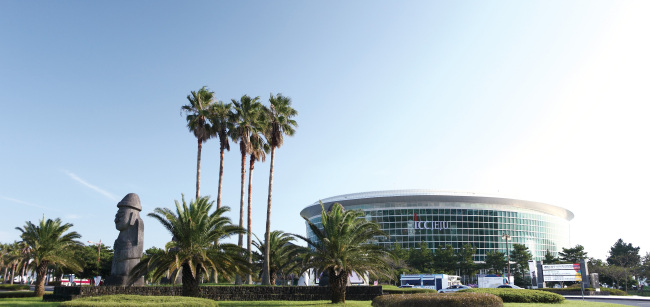As the fifth-largest stakeholder of the Asian Infrastructure Investment Bank, South Korea is ramping up efforts on multiple fronts in a bid to contribute to the improvement of Asia’s infrastructure.
As part of the efforts, Korea became the second country to host the 2017 annual meeting of the Beijing-led multicultural financial organization representing Asian nations on Jeju Island, outside of China for the first time, from Friday to Saturday.
 |
International Convention Center Jeju (ICC Jeju) |
The relatively new AIIB held its first annual meeting last year in Beijing to mark its establishment. In the 1 1/2 years since its foundation, the institution has attracted a total of 77 members, exceeding 67 members of the Asian Development Bank.
As of May, the AIIB offered a total of $2.18 billion loans for 13 infrastructure projects across Asia.
According to forecasts by ADB, new demand for constructing or improving infrastructure in Asia is estimated to be worth $1.3 trillion each year by 2030. Total investments in infrastructure in the region stood at $881 billion in 2015. Based on an assumption that the amount would be kept similar to the 2015 figure, about $459 billion is forecast to be the yearly shortfall.
The Korean government believes one of the easiest ways to contribute to improving the quality of infrastructure across Asia is to expand its presence within the AIIB and make more room for Korean businesses with outstanding technologies to participate in infrastructure projects financed by the institution.
To exert greater influence within the AIIB, the Ministry of Strategy and Finance is formulating a series of strategies to make a greater contribution to the multinational institution, said Choi Ji-young, director of the international financial institutions division at the ministry.
“The strategies will largely focus on increasing Korea’s participation in the AIIB meetings and programs proactively, and build cooperative relations with member countries,” Choi sad.
The fourth-biggest Asian economy holds a 4.06 percent stake in AIIB worth about 4 trillion won ($3.4 billion). It is too early to raise the stake in the organization, but if special requests are made, the Korean government would consider a larger stake in the long run, according to the director.
Yoon Tae-sik, head of preparation team for the upcoming meeting, agreed and said, “Korea has already secured a significant say at the AIIB with the stake.
“We will provide opportunities for delegates of AIIB member countries and businesses from each country to meet Korean businesses at the event and help them establish effective business networks.”
According to a recent report by the Bank of Korea, Korean businesses will have a competitive edge over their peers from the other continents in securing project orders taking place in the region.
“Within the bloc, the scope of companies that can execute large infrastructure projects is limited to Korean players and a few others, due to deep knowledge about geographical features,” the report said.
AIIB members are paying attention to the capabilities of Korean companies after an announcement was made that Korea Water Resources Corp. will take part in the construction of a $1 billion-worth hydro power plant complex in Georgia, the first project financed by the AIIB for up to $87 million.
“In particular, Korean builders can take advantage of their abundant experience in various construction projects in Asia based on their long-held relations with local partners there,” it said.
To give Korean business opportunities to participate in AIIB-financed projects, the Finance Ministry is also trying to send more Korean officials to the organization.
Currently, Kim Yoon-kyung, director general of international financial cooperation is serving as a director at AIIB with five working-level officials.
The Georgia project could be successfully financed by the AIIB owing to the efforts of the Korean officials at the institution, who introduced K-Water’s technologies and capabilities to the Georgian government and related businesses there, the Finance Ministry said.
State-run financial institutions -- Korea Development Bank, Export and Import Bank of Korea, Korea Trade Insurance Corp. -- are also preparing measures to set up effective measures to finance in order to support Korean firms to win overseas projects.
KDB was the first public financier to co-fund the Georgia project with the AIIB. The Korean state-run bank was credited for convincing the AIIB about profitability of the hydro power plant project to get the fund.
“KDB plans to provide a so-called ‘Korea Package’ support by the government, financial institutions and businesses to help pave ways for overseas expansion of Korean businesses,” a bank official said.
The public institutions are also planning to create funds in cooperation with commercial banks to funnel an ample amount of financial resources into Korean firms.
By Song Su-hyun (
song@heraldcorp.com)








